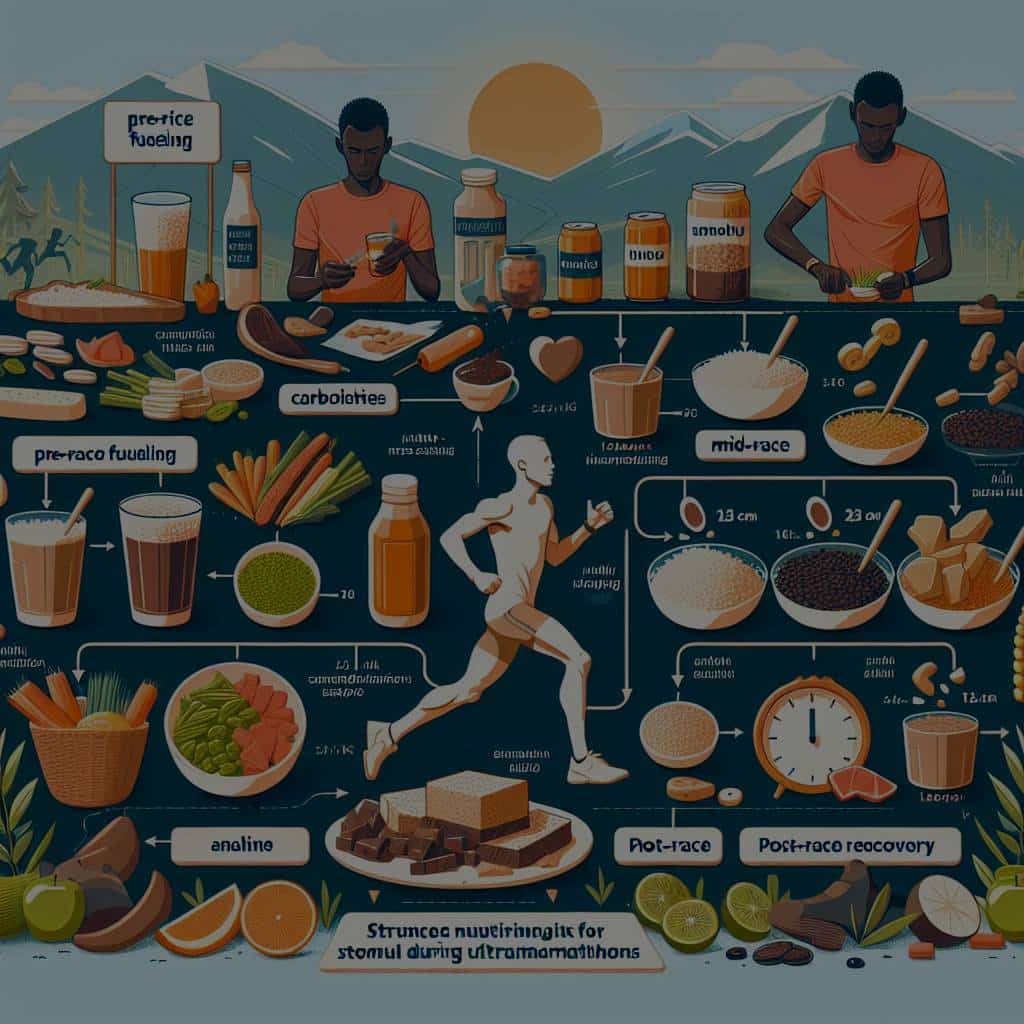How to Structure Nutritional Intake for Optimal Energy During Ultramarathons?

Ultramarathons represent the extreme end of the endurance spectrum in sports. These races demand significant energy and resources from your body, requiring a solid nutrition strategy to support your performance. In this article, we’ll explore specific strategies for structuring nutritional intake to maintain energy levels during these grueling events.
Understanding the Demands of an Ultramarathon
Before diving into the specifics of nutrition for ultramarathons, let’s first understand the physical demands of these races. An ultramarathon is any foot race longer than the traditional marathon length of 26.2 miles, with distances often ranging from 50 kilometers to 100 miles or more.
Sujet a lire : What Are the Benefits of Biofeedback for Archers to Control Nervousness?
Participating in an ultramarathon is not a walk in the park. It places a significant demand on your body, draining energy reserves at a rapid rate. The body primarily uses carbohydrates and fat stores for energy. According to a study published in PubMed, glycogen stores (the body’s primary source of energy) can become depleted after just 2 hours of intense exercise.
If not properly managed, this rapid depletion of energy reserves can lead to ‘hitting the wall’ – a state of extreme fatigue and a sharp decline in performance. This underlines the need for strategic nutrition planning to maintain energy levels and performance during an ultramarathon.
A lire en complément : Can High-Intensity Interval Training Enhance Endurance in Competitive Rowers?
Fueling Up Before the Race
A well-structured pre-race nutrition plan is crucial to ensure that your body’s energy stores are fully stocked before the starting gun goes off. The goal is to maximize glycogen stores, which is achieved by consuming a high-carbohydrate diet in the days leading up to the race.
Many athletes employ the strategy of carbohydrate loading, which involves increasing the percentage of calories from carbohydrates to about 70-85% in the 2-3 days before the race. This practice can effectively maximize glycogen stores, providing the necessary fuel for prolonged endurance exercise.
Hydration is another critical aspect of pre-race nutrition. Maintaining optimal fluid balance is important to prevent dehydration, which can impair performance. Aim to consume plenty of fluids in the days before the race and avoid drinks with high amounts of sugar that can lead to gastrointestinal discomfort.
Managing Nutrition During the Race
Once the race is underway, your nutrition strategy should aim to replace the energy being burned and maintain hydration levels. This will help to prevent the onset of fatigue and maintain performance.
Carbohydrate intake during the race is crucial. According to a review article in PubMed, endurance athletes should aim to consume 30-60 grams of carbohydrates per hour during prolonged exercise. This can be achieved through a combination of sports drinks, gels, bars, and real food, based on individual preference and tolerance.
Hydration is also critical during the race. Fluid needs can vary widely depending on the weather conditions and individual sweat rate, but a general recommendation is to drink enough to prevent a weight loss of more than 2% during the race.
Post-race Recovery Nutrition
The recovery phase is often overlooked but is a crucial part of the strategy for ultramarathon participants. Proper post-race nutrition can help to replenish depleted energy stores and facilitate muscle repair, promoting faster recovery and reducing the risk of injury.
It is recommended to consume a combination of carbohydrates and protein within 30 minutes to 2 hours after finishing the race. A ratio of 3:1 or 4:1 (carbohydrates to protein) is often suggested to maximize muscle glycogen resynthesis and promote muscle repair.
Additionally, rehydration should be a priority after the race. Consuming fluids along with sodium (to replace lost electrolytes) can aid in restoring fluid balance.
Supplementing Your Ultramarathon Nutrition Strategy
Beyond the basics of carbohydrate loading, hydration, and post-race recovery, there are various supplements that could potentially enhance performance and recovery in ultramarathon races.
Caffeine is one such supplement used by many endurance athletes. Research from a study posted on CrossRef indicates that it can improve endurance performance by making exercise seem less strenuous. Other supplements, such as beetroot juice, which is high in nitrates, have also been shown to improve endurance performance.
However, it’s important to note that supplement use should complement a well-structured nutrition plan, not replace it. Always consult with a sports nutrition professional before starting any supplement regimen.
Ultimately, nutrition for ultramarathons is highly individual and should be tailored to each athlete’s needs and preferences. Practicing your nutrition strategy during training can help to identify what works best for you and prepare you for success on race day. Remember, successful ultramarathon performance is not just about running; it’s about fueling your body effectively too.
Exploring the Role of the Small Intestine in Nutrient Absorption During Ultramarathons
The small intestine plays a pivotal role in the absorption of nutrients during ultramarathons. Given the high energy expenditure during such races, understanding this process is crucial to optimize your nutritional strategy.
During prolonged periods of high-intensity exercise, such as an ultramarathon, the small intestine absorbs nutrients from the food and drinks consumed. This process is essential as it allows energy to be extracted and used to fuel the body’s muscles. However, the small intestine’s capacity for nutrient absorption is limited. For instance, according to a study published on PubMed, the absorption rate of carbohydrates is approximately 60 grams per hour.
Overloading the small intestine with more nutrients than it can absorb can lead to gastrointestinal discomfort, impairing performance. Therefore, a balanced strategy is needed to maximize nutrient absorption while minimizing gastrointestinal issues.
To achieve this balance, endurance athletes often use multiple transportable carbohydrates, such as glucose and fructose. These two types of carbohydrates utilize different transport mechanisms in the small intestine, allowing higher absorption rates compared to consuming a single type of carbohydrate. According to an article on Google Scholar, this strategy can result in a 20-50% increase in carbohydrate absorption and improve performance.
Furthermore, proper hydration is vital for optimal nutrient absorption. Dehydration can reduce blood flow to the small intestine, impairing nutrient absorption. Thus, maintaining fluid balance during the race is essential to optimize nutrient absorption and maintain energy levels.
Fine-tuning Your Nutrition Strategy During Training
The importance of honing your nutrition strategy during training cannot be overstated. As Heather Hart, a seasoned ultra endurance athlete and an ACSM certified coach, often notes, "practice makes perfect."
Training sessions provide the perfect platform to experiment with and fine-tune your nutrition strategy before race day. This allows you to identify which foods and drinks your body tolerates best and how frequently you should consume them to sustain energy levels without causing gastrointestinal discomfort.
For instance, you may experiment with different types and amounts of carbohydrates, such as energy bars or gels, to identify what maximizes your energy intake without overloading your small intestine. You can also experiment with different hydration strategies to maintain optimal fluid balance.
Training is also an excellent opportunity to experiment with potential supplements. As mentioned earlier, supplements such as caffeine and beetroot juice can enhance endurance performance. However, individual responses to these supplements can vary, making it crucial to test them during training.
However, always remember that supplements should augment a well-structured nutrition plan, not replace it. It’s also advised to consult with a sports nutrition professional before starting any supplement regimen.
Conclusion
Planning your nutritional intake for an ultramarathon is a multifaceted process. It involves understanding the energy demands of the race, fueling up adequately before the race, managing nutrition during the race, and prioritizing recovery nutrition. It also entails understanding the role of the small intestine in nutrient absorption and fine-tuning your nutritional strategy during training.
Nutrition for ultramarathons is highly personalized, and what works for one athlete may not work for another. Therefore, it’s vital to experiment during training to identify the strategies that work best for you. Consulting with a sports nutrition professional can also provide valuable insights and guidance.
In the end, remember that success in ultramarathons isn’t just about the distance you run. It’s also about how effectively you fuel your body. As the saying goes, "you can’t outrun a bad diet." Proper nutrition is an essential component of any successful ultra marathon strategy.
